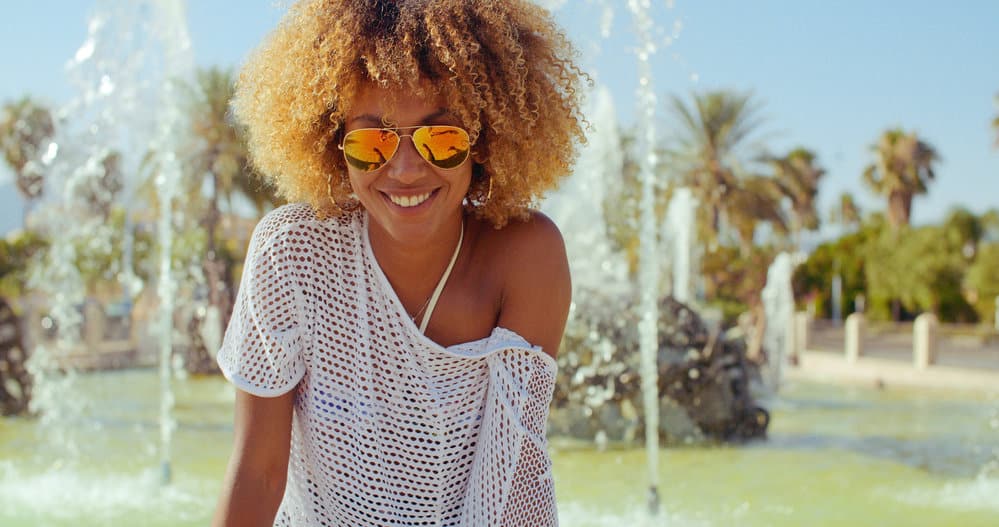
Nothing beats the heat like taking a refreshing dip in the pool. But what if you’ve just dyed your hair? Could your tresses end up ruined? Can you go swimming after dyeing your hair?
Keep reading to find out! In this article, we’ll look at what happens when you go swimming after dyeing your hair and give you tips on protecting your hair color. Let’s dive right in!
Table of Contents
Can You Go Swimming After Dyeing Your Hair?
We’re happy to tell you that you can absolutely go swimming after you dye your hair! However, taking protective measures before and after your dip in the pool will help you avoid some of the adverse side effects that could occur.
The precautions you should take to protect color-treated hair will differ slightly depending on the type of water you plan on swimming in and whether you want to swim indoors or outdoors.
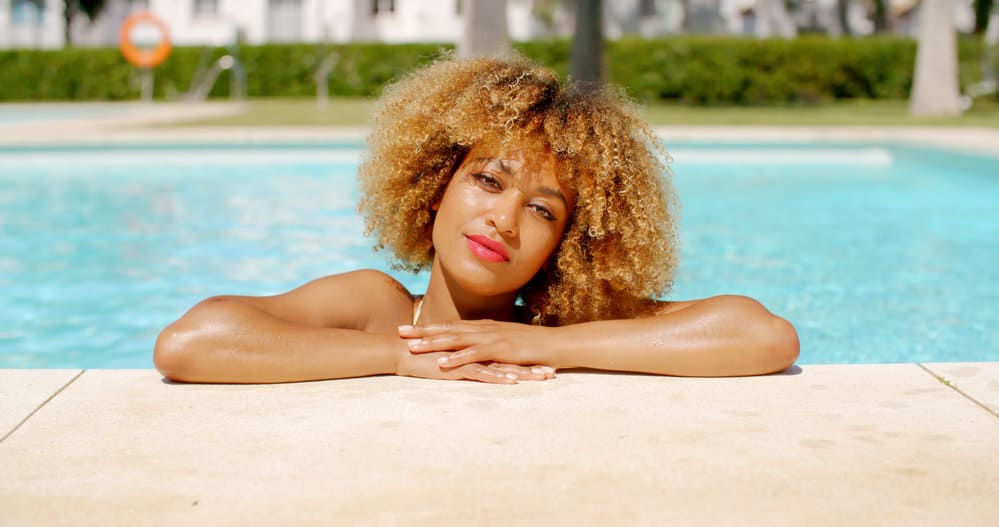
How Long Should You Wait to Swim After Dyeing Your Hair?
The longer you wait to swim after dyeing your hair, the better it will be for your color. Waiting gives your cuticles a chance to close and lock your color inside your strands. The specific length of time you should wait depends on the type of dye you used to color your locks.
Permanent and Demi-Permanent Color
For permanent and demi-permanent colors, try to hold off for at least a week before you go swimming. Permanent hair dye contains harsh chemicals that may react with the chlorine in pool water and ruin your color.
Semi-Permanent Color
On the other hand, you can go swimming in as little as three to five days if you use semi-permanent color. Semi-permanent hair dye is formulated with gentler ingredients, so the risk of a reaction that ruins your recently dyed hair is pretty low.
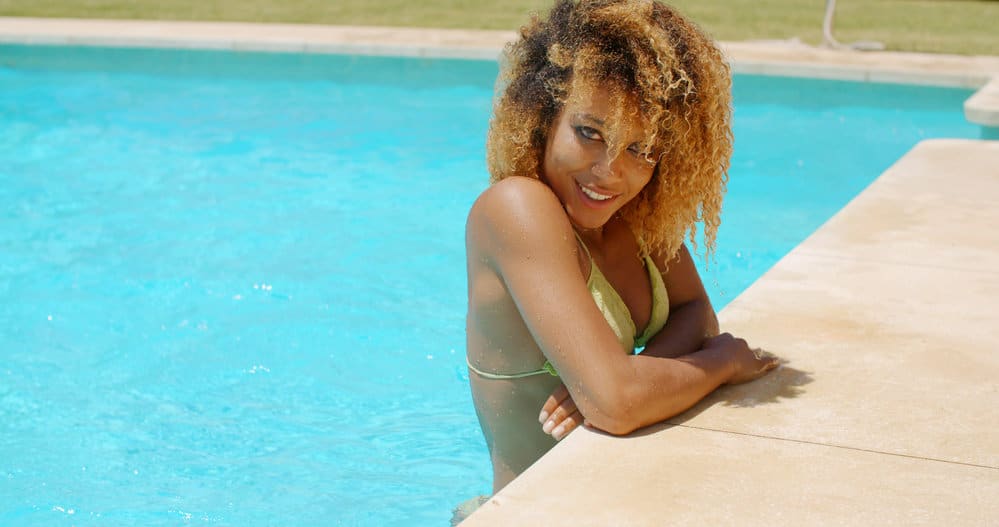
What Happens If You Swim with Dyed Hair?
Although you can go swimming with colored hair, it's not without risks. Both chlorinated and salt water can dry your hair out and lead to damage or hair loss.
In addition to the water, outdoor swimming exposes your hair to the damaging effects of sunlight. Swimming indoors and outdoors can cause your color to fade quickly or become dull.
You might even experience a color change, depending on the type of dye you used and how long you waited to take a dip in the water. One of the most well-known side effects of swimming after lightening your locks is green hair, which we will take a look at below.
Green Hair After Swimming
As many swimming enthusiasts know, a dip in the pool can leave you with sickly green strands. Although green hair is most closely associated with chlorinated water, this is somewhat of a misconception.
In addition to chlorine, pool water is rich in dissolved hard metals like manganese and copper. When the chlorine reacts with copper, it creates a film that sticks to your hair.
The metals are then oxidized, and your hair takes on a green glow. Although darker shades can also take on a green tint, the effect is most noticeable on blonde or extremely light hair.
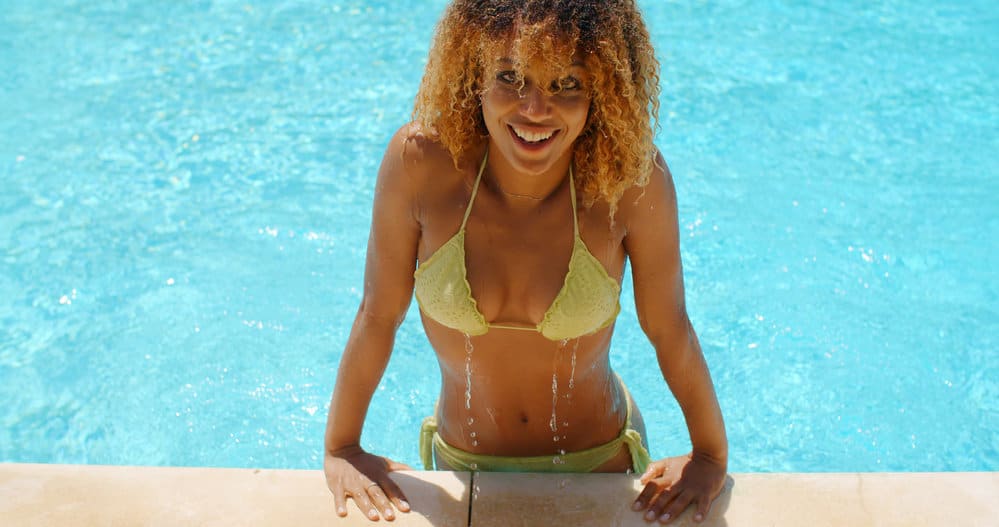
How to Protect Dyed Hair at the Pool
Luckily, you don’t have to choose between a day at the pool and gorgeous color. Here are a few techniques you can use to protect your colored hair at the pool. One or more of them is sure to work for you!
Wear a Swimming Cap
A well-fitting swim cap is the single most effective way to protect your hair at the pool. Swim caps are thin, tightly fitting hats made from a stretchy material like silicone or latex.
They prevent chlorine from coming into contact with your hair by creating a physical barrier between your strands and the pool water. Swim caps come in a variety of sizes and colors, so you’re sure to find one that fits your personal style.
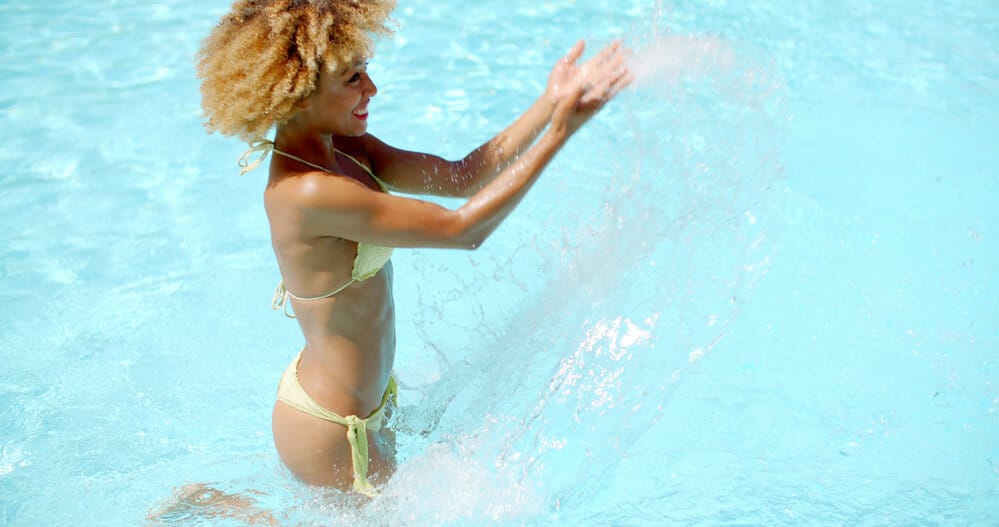
Wet Your Hair Before Swimming
If swimming caps aren’t your style, we have another simple solution that only requires good old H2O. All you have to do is saturate your hair with fresh water before your swim.
Think of your hair as a dry sponge. The drier the sponge is, the more water it will soak up. By filling your strands with fresh water, you’re limiting the amount of chlorinated water it can absorb.
Applying a leave-in conditioner to your damp strands makes this method even more effective. The conditioner serves a double purpose.
On the one hand, it will further prevent the chlorinated water from soaking into your strands. And it will also give your fragile, chemically treated hair some much-needed nourishment.
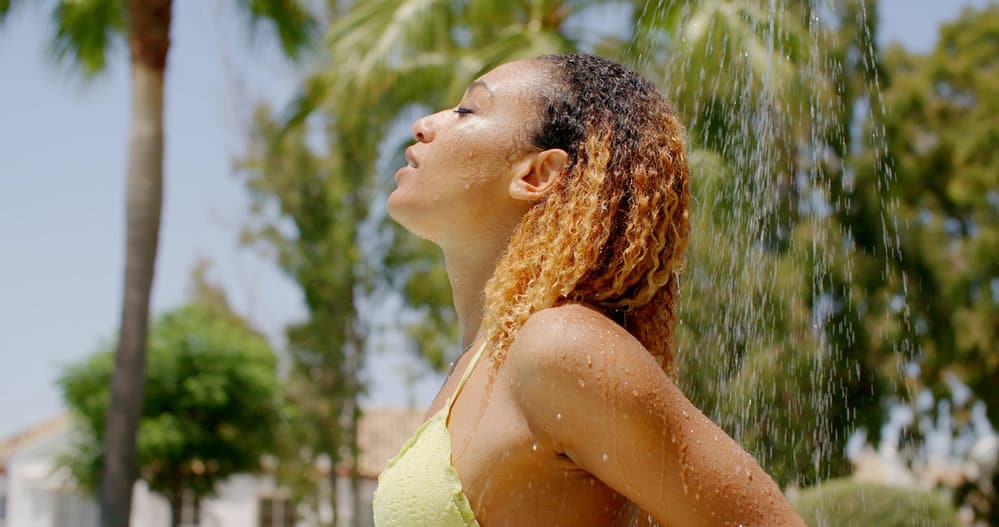
Apply a Protective Oil to Your Strands
Like leave-in conditioners, oils create a barrier that stops chlorinated water from penetrating your strands. Instead, the water will simply bead up and roll down the length of your strands without sinking in.
As a bonus, many oils are full of vitamins and antioxidants that nurture your strands. You can use virtually any hair oil, but here are some of our top recommendations:
- Grapeseed oil
- Coconut oil
- Olive oil
- Jojoba oil
- Related articles:
Wash Your Hair as Soon as You Get Out of the Pool
The sooner you remove the chlorinated water from your hair, the less damage it will be able to cause. When left to sit on the hair, chlorine can fade or lighten your color. It can even cause hair loss!
To combat this, wash your hair with a chelating shampoo as soon as possible once you finish swimming. Chelating shampoos have a high concentration of cleansing ingredients that can remove stubborn chlorine and dissolved minerals from your strands.
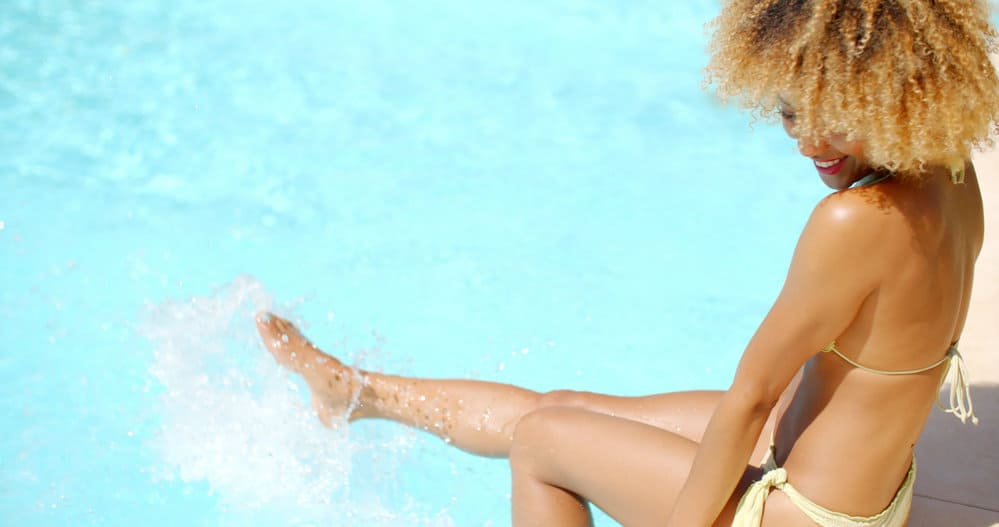
Cover Your Hair
In an outdoor pool, sunlight can wreck your color just as much as chlorine. That is also true if you plan on swimming at the beach or a lake. Sunlight contains UV rays that break down the chemical bonds holding your color in place.
To prevent the sun's harsh rays from reaching your strands, keep your hair covered as much as possible. Water magnifies the harmful effects of the sun, which can cause your hair to fade much faster than it normally would.
While physical barriers like hats and scarves give you the most protection, you can also opt for a more subtle solution like hair sunscreen. It contains ingredients that block out harmful UV radiation, which will help ease the color fading effects of sun exposure.
Keep Your Hair Out of the Water
Whenever you find yourself at a pool without any protective options, try to keep your hair out of the water as much as possible. You can either keep the upper half of your body out of the water or put your hair in a more protective style.
Buns, braids, and twists help limit your hair’s exposure to the elements. They keep your strands grouped together and away from the damaging effects of the sun and water.
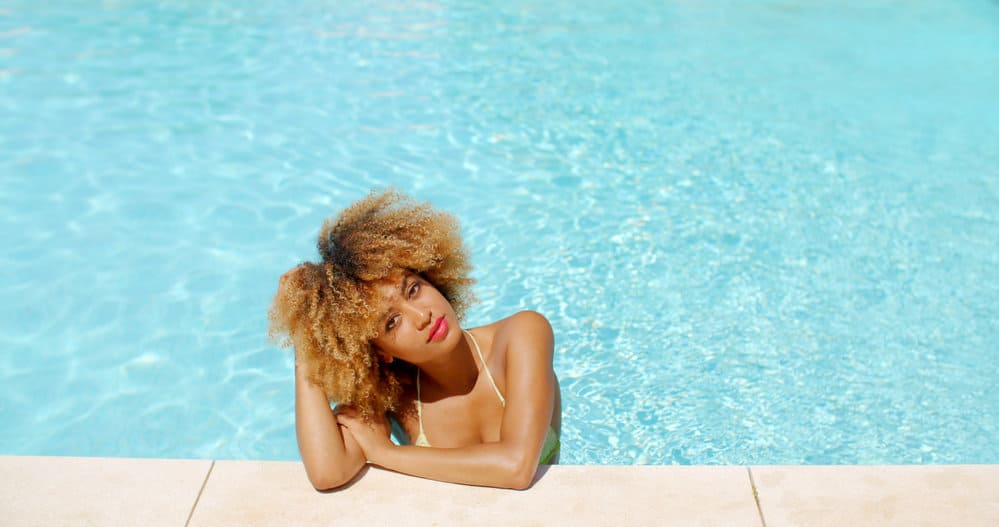
Use a Pre-Swimming Treatment
Frequent swimmers might want to invest in a more targeted solution. Pre-swimming hair products contain a blend of ingredients that stop chlorine, salt, and dissolved minerals before they have a chance to penetrate your strands.
Don’t know where to find one? Consider this color-safe, paraben, and gluten-free hair mask. It locks in moisture and seals your hair in as little as three to five minutes before your swim.
- Why Is My Hair Curly When Wet?
- Can You Get Box Braids Wet?
- Can You Swim With Knotless Braids?
- Is It Okay to Get Your Hair Wet Everyday?
To sum things up, you can go swimming after you color your hair. Just make sure you take protective measures to keep your color beautiful and vibrant.
We hope this article has shown you how to do just that. Now you’ve got all you need to have a blast in the water without a care in the world!




